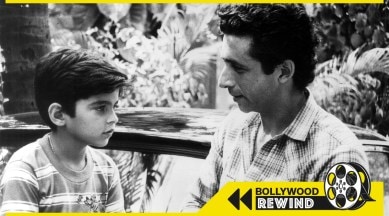Click here to follow Screen Digital on YouTube and stay updated with the latest from the world of cinema.

When Shekhar Kapur made Masoom 40 years ago, Hindi cinema was a different beast altogether. The audience was still trying to get out of the hangover of the angry young man of the ’70s, and the ’80s were yet to find their identity. That identity never got the respect it was looking for but that’s a discussion for another day. Amid the struggle to find what would work for the audience in that era of over-the-top and loud cinema where actors would often ham it up on screen, came a quiet contender that eventually became one of the most respected films of that decade. Shekhar Kapur’s Masoom was hardly the candidate that would qualify itself as the film that would move the masses as this was the year of films like Coolie, Hero, Himmatwala, Betaab, but 40 years later, Masoom has aged better than any of its contemporaries.
Masoom’s plot revolved around a family living a near-perfect life. DK (Naseeruddin Shah) and Indu (Shabana Azmi) have two beautiful daughters and everything working for them. That is until one day, DK finds out that he has a son from a short-lived affair with a woman (Supriya Pathak) who has died, leaving the responsibility of the young boy Rahul (Jugal Hansraj) on to him. Indu is shattered, and while DK is terribly sorry for his affair, he can’t abandon his son. This dilemma of trying to do the right thing forms the story of Masoom.
Naseer and Shabana are two of the best actors to have ever appeared on screen in Hindi cinema but at the time, they weren’t the thespians they are treated as today. Their effortless chemistry makes you believe in the strong foundation of their relationship and also makes you wonder if chemistry can be created between any two actors who know their craft well. Although, Shekhar believed that here, Naseer did not act, “he just was.” In fact, in a Filmfare interview, he said that Naseer modelled the character of DK on him. “He started to speak like me because he said, if Shekhar doesn’t want to define the character, obviously it is somewhere in his subconscious. And if you look back at Masoom now, one of the best things about it is that Naseer is human. It’s a completely human film, there was no attempt to make the actors very defined. We wove a plot around them.”
Naseer plays DK as a person who is torn between his responsibility towards his family – Indu and their two daughters, and his son Rahul. And while he is fully aware that he has broken Indu’s spirit, he can’t go back in time and erase the existence of his son. In one of the scenes, DK excitedly exclaims that he is proud of his son during a cricket match but immediately stops himself. Indu notices this and is taken aback by the volcano of love that has erupted in him. It is interesting to note how Shekhar composed DK’s family. His children with Indu are both girls, and the child out of wedlock is a son. DK’s excitement for his son appears in a scene where it is implied that he has never experienced a similar incident with his girls, which also makes you think how DK would have reacted if he had another girl instead of Rahul.
Shekhar, in an archival interview shared by Wild Films India, said that he got the idea for Masoom from Erich Segal’s Man, Woman and Child. The book moved him to tears and hence, he decided to make a movie based on the same subject. Kapur claimed that he did not credit the book because he changed the plot, and “thought my film was far better than the book.”
Masoom ends with all of them living as a united family and it makes you wonder how their lives would have moved on from that point. And it is perhaps those questions that will be answered in the sequel of the film. His daughters – who were extremely loving and caring towards Rahul – didn’t know that he was the living proof of the fact that their father wasn’t the perfect saint they thought him to be. Indu accepts Rahul into her family not because she has forgiven DK, but only because she knows that she can’t disintegrate the seemingly happy family and make her daughters live sans their father, but it is evident that things between DK and Indu are altered for life. And for Rahul, it would be interesting to see how the fragile boy, who was so unsure of his place in DK’s family found himself in this otherwise cruel world.
Masoom doesn’t glorify infidelity, but it doesn’t glorify any aspect of relationships. The film remains honest with its kids (even though the characters aren’t) who are perhaps the most masoom (innocent) in the entire scheme of things, but when Kapur ends up making the sequel that he just announced, that innocence wouldn’t be a part of the picture anymore.
Click here to follow Screen Digital on YouTube and stay updated with the latest from the world of cinema.